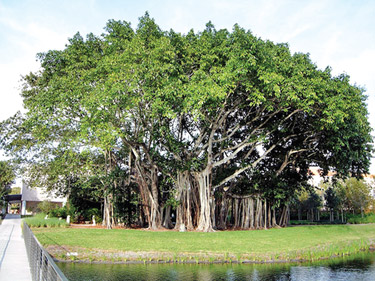|

Global
Warming
Carbon
dioxide's effects on plants increases it
Trees and other plants help keep the planet cool, but rising levels
of carbon dioxide in the atmosphere are turning down this global air
conditioner. According to a new study by researchers at the Carnegie
Institution for Science, in some regions more than a quarter of the
warming from increased carbon dioxide is due to its direct impact on
vegetation.

This warming is in addition to carbon dioxide's better-known effect
as a heat-trapping greenhouse gas. For scientists trying to predict
global climate change in the coming century, the study underscores the
importance of including plants in their climate models.
"Plants have a very complex and diverse influence on the climate
system," says study co-author Ken Caldeira of Carnegie's Department of
Global Ecology. "Plants take carbon dioxide out of the atmosphere, but
they also have other effects, such as changing the amount of evaporation
from the land surface. It's impossible to make good climate predictions
without taking all of these factors into account."
Plants give off water through tiny pores in their leaves, a process
called evapotranspiration that cools the plant, just as perspiration
cools our bodies. On a hot day, a tree can release tens of gallons of
water into the air, acting as a natural air conditioner for its
surroundings. The plants absorb carbon dioxide for photosynthesis
through the same pores (called stomata). But when carbon dioxide levels
are high, the leaf pores shrink. This causes less water to be released,
diminishing the tree's cooling power.
The warming effects of carbon dioxide as a greenhouse gas have been
known for a long time, says Caldeira. But he and fellow Carnegie
scientist, Long Cao were concerned that it is not as widely recognised
that carbon dioxide also warms our planet by its direct effects on
plants. Previous work by Carnegie's Chris Field and Joe Berry had
indicated that the effects were important. "There is no longer any doubt
that carbon dioxide decreases evaporative cooling by plants and that
this decreased cooling adds to global warming," says Cao. "This effect
would cause significant warming even if carbon dioxide were not a
greenhouse gas."
In their model, the researchers doubled the concentration of
atmospheric carbon dioxide and recorded the magnitude and geographic
pattern of warming from different factors.
They found that, averaged over the entire globe, the
evapotranspiration effects of plants account for 16 per cent of warming
of the land surface, with greenhouse effects accounting for the rest.
But in some regions, such as parts of North America and eastern Asia, it
can be more than 25 per cent of the total warming.
"If we think of a doubling of carbon dioxide as causing about four
degrees of warming, in many places three of those degrees come from the
effect of carbon dioxide in the atmosphere, and one comes from the
direct effect of carbon dioxide on plants."
The researchers also found that their model predicted that high
carbon dioxide will increase the runoff from the land surface in most
areas, because more water from precipitation bypasses the plant cooling
system and flows directly to rivers and streams. Earlier models based on
greenhouse effects of carbon dioxide had also predicted higher runoff,
but the new research predicts that changes in evapotranspiration due to
high carbon dioxide could have an even stronger impact on water
resources than those models predict.
"These results really show that how plants respond to carbon dioxide
is very important for making good climate predictions," says Caldeira.
"So if we want to improve climate predictions, we need to improve the
representation of land plants in the climate models.
More broadly, it shows that the kind of vegetation that's on the
surface of our planet and what that vegetation is doing is very
important in determining our climate. We need to take great care in
considering what kind of changes we make to forests and other
ecosystems, because they are likely to have important climate
consequences.
-ScienceDaily
Name: S. A. Dananjan
Kaushika Samaratunga
Gender: Male
Age: 14
Hobbies: Reading story
books, collecting stamps, playing chess and computer games
Pen-pals preferred from:
UK and USA
Age group: 13-14
Address: No. 197,
Bandaranayaka Mawatha, Kegalle, Sri Lanka.
Name: K. G. Hansika
Piumali
Gender: Female
Age: 13
School: Mo/Medagama
National School
Hobbies: Reading story
books, collecting stamps
Pen-pals preferred from:
England, Australia, USA, China, Japan, India, New Zealand, Canada, Sri
Lanka
Age group: 12-16
Address: Perakum Mawatha,
Radeliyadda, Bibile, Sri Lanka.
------
Name: Christina F. R.
Clogsloun
Gender: Female
Age: 15 years
School: St. Lawrence
School, Colombo 6
Hobbies: Listening to
music, watching TV, playing computer games and reading books
Pen-pals preferred from:
Any country including Sri Lanka
Age group: 15-17 years
Address: No. 1, 4th Lane,
Angulana Stadium Road, Angulana, Moratuwa, Sri Lanka.
-------
Name: T. M. Sagarika
Dilhani
Gender: Female
Age: 16
Hobbies: Reading books,
collecting stamps, watching TV, listening to music
Pen-pals preferred from:
Sri Lanka
Age group: 16-21
Address: Koongoda, Yakwila,
Sri Lanka.
-----
Name: T. Bawedarane
Gender: Female
Age: 12
School: Highland Central
College
Hobbies: Reading books
Pen-pals preferred from:
Any country except Sri Lanka
Age group: 11-16 (female)
Address: Tillarie, U.D.
Dickoya, Nuwaraeliya, Sri Lanka.
Name: M. I. Fathima Ishra
Gender: Female
Age: 16
School: Mr/Minhath
National School, Dickwella
Hobbies: Reading story
books, watching TV, reading newspapers, listening to the radio
Pen-pals preferred from:
Any country, especially Sri Lanka
Age group: 16-18
Address: No. 390,
Younakapura, Dickwella, Sri Lanka.
Name: M. I. Fathima Isma
Gender: Female
Age: 12
School: Mr/Minhath
National School, Dickwella
Hobbies: Reading story
books, gardening, playing, watching TV
Pen-pals preferred from:
Any country (especially Sri Lanka)
Age group: 11-14
Address: No. 390,
Younakapura, Dickwella. |

